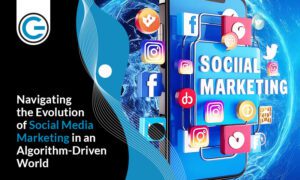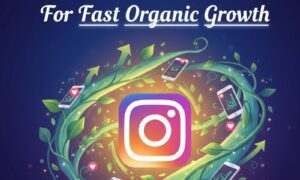Introduction
In today’s digital-first world, businesses can no longer afford to overlook the importance of social media marketing. Social platforms have become the modern marketplace where conversations happen, brands are discovered, and customer relationships are built. Companies like we-interactive.com specialize in helping businesses harness the power of social media to reach wider audiences, generate leads, and create lasting customer engagement.
But what exactly makes social media marketing such a game-changer for businesses? Let’s break it down step by step.
What is Social Media Marketing?
Social media marketing (SMM) refers to the use of platforms like Facebook, Instagram, LinkedIn, Twitter (X), TikTok, and YouTube to promote products, services, or a brand. It involves creating and sharing engaging content, running paid advertising campaigns, and analyzing results to continuously improve strategies.
Unlike traditional marketing, which often focuses on one-way communication, SMM thrives on interaction. Businesses don’t just broadcast messages—they engage in conversations with their customers, making the brand more relatable and human.
Why Social Media Marketing Matters in 2025
The relevance of social media marketing continues to grow every year. According to Statista, there are over 4.9 billion active social media users worldwide, and that number is expected to keep climbing. This massive user base gives businesses direct access to potential customers across different age groups, demographics, and interests.
Key reasons why SMM is essential include:
- Enhanced visibility – Your brand is discovered by new audiences every day.
- Direct communication – Engage with customers instantly, resolving issues and answering questions.
- Cost-effective marketing – Organic strategies and targeted ads maximize ROI.
- Data-driven insights – Platforms provide analytics to fine-tune campaigns.
Core Components of Social Media Marketing
To achieve success, businesses must focus on several key components:
1. Content Creation and Strategy
Quality content is the backbone of any social media campaign. Posts should align with your brand’s identity and offer value to your audience. This includes blog snippets, infographics, videos, user-generated content, and interactive stories.
2. Audience Targeting
Social platforms allow advanced targeting options based on demographics, behavior, and interests. This ensures your message reaches the people most likely to engage with your brand.
3. Engagement and Community Building
Responding to comments, hosting polls, and sharing behind-the-scenes content makes your brand feel approachable and human. Building a loyal community increases customer retention.
4. Paid Advertising
Social media ads, when executed strategically, boost brand visibility quickly. With options like Facebook Ads, Instagram promotions, and LinkedIn campaigns, businesses can reach highly specific segments.
5. Analytics and Performance Tracking
Tracking KPIs such as reach, engagement, clicks, and conversions ensures your campaigns deliver measurable results.
Benefits of Social Media Marketing
The advantages of investing in SMM go beyond likes and shares. Businesses that commit to consistent social media strategies often experience:
- Increased brand awareness
- Improved website traffic
- Higher conversion rates
- Enhanced customer trust and loyalty
- Better competitive positioning
For example, brands working with experts like we-interactive.com benefit from professional guidance, ensuring every post and campaign aligns with business goals.
Social Media Platforms and Their Unique Strengths
Each social media platform serves a different purpose. Here’s a breakdown:
- Facebook – Great for community building, events, and local ads.
- Instagram – Best for visual branding and lifestyle marketing.
- LinkedIn – Ideal for B2B marketing and professional networking.
- TikTok – Popular for short-form, viral video content.
- Twitter (X) – Effective for real-time updates and customer service.
- YouTube – Perfect for long-form video content, tutorials, and storytelling.
Choosing the right platform depends on your target audience and marketing objectives.
Common Challenges in Social Media Marketing
While SMM is powerful, it comes with challenges:
- Content fatigue – Audiences expect fresh and engaging content regularly.
- Algorithm changes – Frequent updates affect organic reach.
- Negative feedback – Brands must handle criticism professionally.
- High competition – Every business is vying for attention.
Working with professional agencies like we-interactive.com helps overcome these challenges with strategic planning and execution.
Best Practices for Successful Social Media Marketing
- Set Clear Goals – Define whether you want more traffic, sales, or engagement.
- Stay Consistent – Post regularly to maintain visibility.
- Leverage Visuals – High-quality graphics and videos attract more attention.
- Use Hashtags Wisely – They expand reach but must stay relevant.
- Collaborate with Influencers – Partner with niche influencers to build credibility.
- Monitor Trends – Stay updated with viral challenges, memes, or cultural moments.
- Track Analytics – Regularly review performance and refine strategies.
The Role of Professional Agencies
For businesses that lack in-house expertise, hiring a professional social media marketing agency is often the smartest move. Agencies provide:
- Tailored strategies
- Content creation and scheduling
- Paid advertising management
- In-depth analytics reporting
- Crisis management
Agencies like we-interactive.com ensure that businesses don’t just participate in social media—they dominate their digital space.
FAQs About Social Media Marketing
- How often should a business post on social media?
It depends on the platform. For instance, posting daily on Instagram or multiple times a week on LinkedIn works best. Consistency is more important than frequency. - Is paid advertising better than organic growth?
Both are important. Paid advertising boosts visibility quickly, while organic strategies build long-term trust and loyalty. - Which social media platform is best for small businesses?
Facebook and Instagram are excellent starting points for small businesses due to their wide user base and affordable ad options. - How long does it take to see results from SMM?
Businesses typically start noticing significant results within 3–6 months of consistent effort. - Why should I hire a professional agency?
Agencies provide expertise, save time, and create data-driven strategies that maximize ROI.
Conclusion
Social media marketing is more than just a trend—it’s a necessity for businesses aiming to thrive in today’s competitive digital landscape. By building brand awareness, driving engagement, and generating sales, SMM opens doors to endless opportunities.
For businesses looking to take their social media presence to the next level, working with professionals like we-interactive.com ensures strategies are not only creative but also results-driven. With the right approach, your brand can stand out, engage meaningfully with audiences, and achieve measurable success online.

































